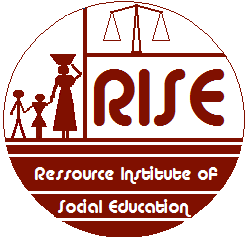HISTORY OF RISE
Resource Institute of Social Education was founded the thirtieth days of September 1982 by ROCHE Victor who had earlier been involved in some community development work in different parts of South Arcot District.
The founder of RISE was a Dalit who knew the economic and social problems of his community. The main idea of starting this charity came to ROCHE Victor while he was working in a project ANIMATORS FOR COMMUNITY DEVELOPMENT.
RISE functions as a non-profit, non-sectarian, non-political and non-governmental organization for promoting in the field of conscientization, adult education, development and women’s liberation in our project.
So, at the beginning, RISE had to provide the main needs of the population:
- Milk animals were provided to widows to make them self-reliant.
- Drinking water. For 5 villages, RISE deepening well which provide drinking water. Drinking water supply to 5 villages by arranging tap connection from over-head tanks.
- Building of houses. With financial help of the government, RISE built 48 Houses for Homeless Dalits..
PAST…

Past activities
Here are some activities the organization undertook in rural Puducherry to achieve these objectives:
Fighting Poverty:
- Microfinance programs: Provided small loans to individuals or groups to start income-generating businesses.
- Skill development workshops: Trained villagers in marketable skills like tailoring, carpentry, or computer literacy.
- Sustainable agriculture practices: Educated farmers on techniques that improve crop yield and soil health. Also Family Farming.
- Village infrastructure development: Advocated for and supported the construction of roads, water wells, houses, graveyards and irrigation systems.
Promoting Community Health:
- Organized health camps: Provided free medical checkups, vaccinations, and basic treatment in rural areas.
- Promoted sanitation awareness: Educated villagers on hygiene practices and the importance of clean water and sanitation facilities.Constructed Toilets.
- Trained community health workers: Empowered villagers to provide basic healthcare services within their communities.
- HIV/AIDS awareness programs: Educated villagers about prevention and treatment options.
Promoting Education:
- Scholarship programs: Provided financial aid to deserving students for higher education.
- Bridge courses and after-school programs: Offered supplementary education to help children from disadvantaged backgrounds keep up with schoolwork.
- Adult literacy programs: Helped adults acquire basic reading and writing skills.
- Computer literacy programs: Equiped youth with digital skills to access information and job opportunities.
Promoting Rural Development and Income Generation:
- Self-Help Groups (SHGs): Facilitated the formation of SHGs, where women pool resources and start small businesses collaboratively.
- Marketing assistance: Helped local artisans and producers find markets for their products through fairs and online platforms.
Protecting Rights and Addressing Social Issues:
- Legal aid programs: Provide legal assistance to those facing discrimination or injustice.
- Women’s empowerment programs: Advocate for women’s rights, provide leadership training, and address gender-based violence.
- Promote social inclusion: Organize programs to address issues faced by marginalized communities, such as caste discrimination and disability.
Environmental Conservation and Awareness:
- Tree-planting drives: Organized tree-planting initiatives to promote afforestation and combat soil erosion.
- Water conservation workshops: Educated villagers on water conservation techniques like rainwater harvesting.
- Renewable energy workshops: Introduced and promoted the use of renewable energy sources like solar power in rural areas.
- Waste management programs: Educated villagers on waste segregation and composting to reduce pollution.
Promoting Peace and Harmony:
- Interfaith dialogues: Organize discussions and events that foster understanding and respect between different religious communities. Organised Peace rallies with the youth.
- Conflict resolution workshops: Equiped community leaders with skills to mediate disputes peacefully.

Past Partners
Our Past Partners
- Asia Partnership for Human Development
- Bread for the World, Germany
- Christian Aid
- SKN, Netherlands
- Norwegian Human Rights Fund
- Caritas Antoniana
- Manos Unidas
- Kindermissionswerk
- Global Releaf American Forest
- CAPART, Govt of India
- Pace e Bene Nonviolence Service
